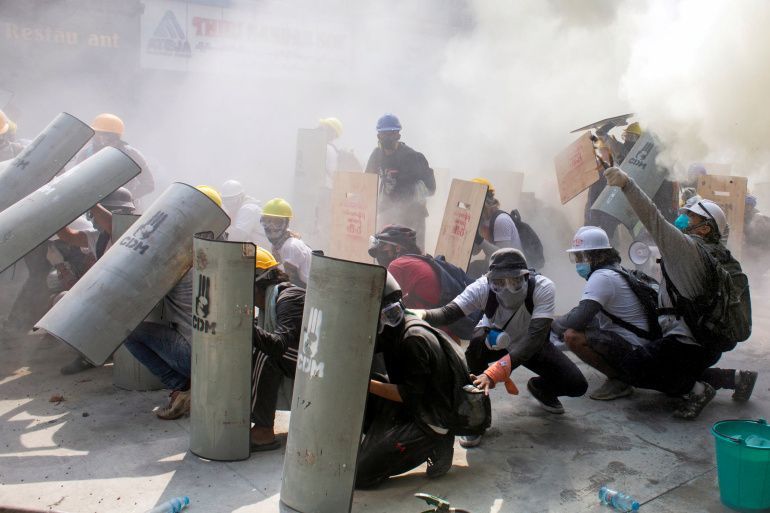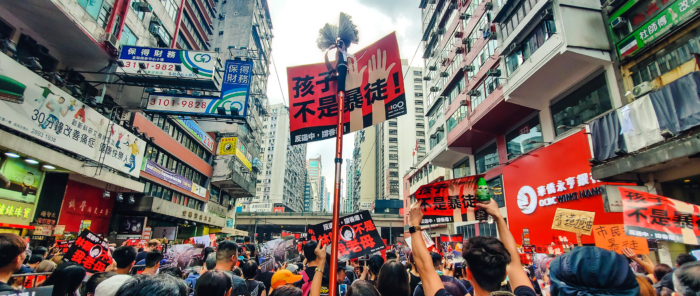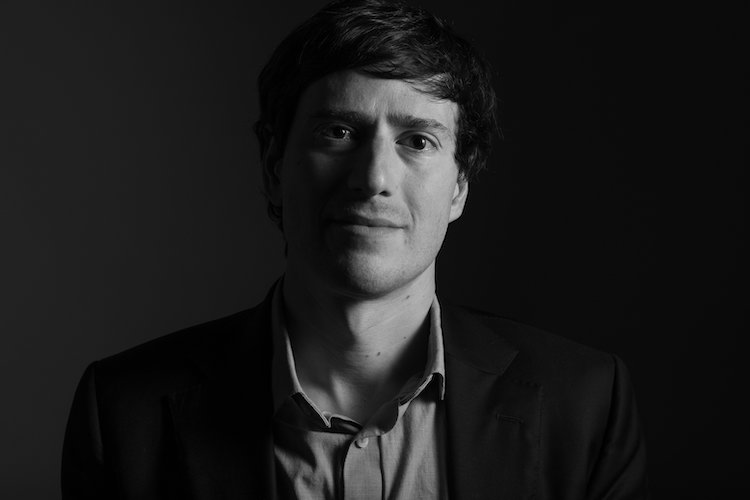Artist
- Alex Gladstein
Chief Strategy Officer
- HRF
About The Artist
Alex Gladstein works at the Human Rights Foundation (HRF). He seems like a man who has found his raison d’etre or Ikigai – the very real and human intersection of freedom and Bitcoin.
"We’re part of a global awakening and it’s great to be here at the beginning of it. It’s an unstoppable force for freedom."
Burma is a country of 54 million people going through a humanitarian crisis, with rampant sectarian violence, repressive laws, forced labour, human traffiking and systematic sexual violence by the military junta. Their banking and currency system is collapsing. Alex, as part of his work for HRF, is using Bitcoin to support activists directly on the ground here.
"We can get money, through Bitcoin, to activists in Burma right now. This isn’t some theoretical future thing. This is happening now."
Just recently, a Pleb on Bitcoin Twitter reached out to him with a desire to support human rights activists there with a Bitcoin donation. Alex messaged a guy who runs a charity in Burma who put him in touch with a network of local activists. They started an encrypted Signal group which shares traumatic updates on human rights abuses. Alex is sending money through Bitcoin, in minutes, to contacts in this network, who are able to sell it into local currency when necessary and financially support their struggle for freedom.
BITCOIN’S DEFENSIVE SHIELD
HRF’s goal is to support people who live under authoritarian regimes around the world. That’s around 4.3 billion people in 95 countries, about 53% of the world’s population, who lack many of the civil and political liberties we take for granted in Western democracies. Of course democratic societies are far from ideal, but within them people at least have mechanisms to push for reforms that they simply don’t have under dictatorships. We have an independent judiciary, Supreme Court, free press, the right for peaceful protest, due process and constitutional rights. If you live in Belarus, Burma, or Ethiopia you don’t have these things.
"At the HRF we’ve noticed that political repression often overlaps with financial repression. 1.3 billion people live under double or triple digit inflation."
Currency manipulation by governments has increased the amount and degree of people living under oppressive regimes by allowing the oppressor to syphon off the productive capacity and wealth of their population. This centralisation of control over money leads to more authoritarianism and repression.
Governments will only NOT steal what they can’t steal and they will only NOT spy on what they can’t spy on. That’s the same in China and the United States. That’s why Bitcoin and encrypted messaging is so important.
"Open source code, encrypted messaging & Bitcoin – those are the ways we can defend our freedoms in the digital age. "
In more than 30 countries around the world including Pakistan, Nigeria, Argentina, Cuba, Lebanon, Syria & Zimbabwe, people suffer from extreme inflation >10% and up to 4000% in Venezuela recently. Governments continue to abuse their power to print currency, often far beyond what we might consider ‘normal’ inflation. People in these countries literally watch goods become more expensive in front of their eyes – it’s happening right now for more than a billion people worldwide.
"I’m not anti government. But I don’t think government, whether tyrannical or democratic, should have control over the creation of money."
Bitcoin is a dual defensive shield against monetary repression (as it’s debasement proof) and political repression, as a tool for freedom through providing a permissionless, censorship resistant parallel economy. The separation of money and state, independence from banks and the freedom to choose your money is one of the most fundamental freedoms we have in a free society. When money is used as a form of censorship through total currency control, it leads to the formation of sovereign entities with immense power and influence over it’s people. This is exactly the kind of controlling dystopia desired through CBDCs, candidly admitted by Agustin Carstens, obese head of the Bank of International Settlements recently.
In case it wasn’t obvious to you yet, here’s the head of the Bank of International Settlements clarifying that the difference between cash and CBDCs is that the former provides privacy while the latter gives the central bank “absolute control” 🥶 pic.twitter.com/pBm7aKxnjJ
— Alex Gladstein (@gladstein) March 19, 2021
ALEX’S BACKGROUND
Alex comes from a Political Science background and studied pro-democracy movements around the world, like the classical struggles against tyranny in Ancient Greece. The Greeks strived towards a system of ‘rules not rulers’ and a desire to participate in the governance and sovereignty of public life. This political engagement has had transformative effects on our modern democratic process.
He believes the Enlightenment, Industrial Revolution and scientific innovation were driven in part by the vital political freedoms they manifested in participants. These political freedoms led to more economic freedoms. South Korea versus North Korea is an interesting example : The North is a ‘self sufficient’ autarky, closed, centralised and Communist nation where people have almost no individual rights – their economic output is poor. In contrast, South Korea has the same ethnic people, yet it’s highly prosperous and pushes global technological limits commercially. It’s incredible to see what South Koreans have built from what is essentially the ashes of a war torn country. Both governments were dictatorships in the 70s & 80s but the South allowed their citizens personal freedoms and these have snowballed into multi-party politics and the world class innovation we see from them today.
"I feel like there’s this deep connection between political freedom and economic freedom. "
Whoever created Bitcoin, was likely a citizen of a free country with an acute awareness of civil and political rights. Bitcoin unlocks political and economic freedom for oppressed people. It allows them to pursue their vocation and liberation.
DEMOCRACIES & DICTATORSHIPS
Free Market Democracies are overwhelmingly the best forms of government, whether it’s New Zealand, Iceland, Norway or South Korea, they’re more peaceful, commit less human rights violations, allow for more innovation, have less indicators of poverty, lower maternal death and infant mortality rates than dictatorships. Democratic political models are important in today’s world and, Alex believes, manifestly better than tyranny or monarchy. This decentralisation of political power is in line with Bitcoin with competing power structures that balance the ecosystem.
"Bitcoin decentralises access & control over money in the same way that democracy & the internet did for political power & information. It’s a positive, progressive force."
No-one’s getting in a boat to risk their life to escape Norway, Texas or Iceland. They’re escaping from Eritrea, North Korea, Afghanistan or Syria. They’re fleeing dictatorships and authoritarian regimes to go to democracies, places that are more free, less repressive and less likely to kill you. In a similar way we’re also seeing a cyberspace migration – people are fleeing to Bitcoin, fleeing the Fiat system. That’s particularly evident right now for savings, but you’re starting to see people flee for other reasons too.
"The co-evolution of MMT and direct stimulus alongside Bitcoin is fascinating. Inflation is inevitable."
It’s interesting that we’re watching the evolution of MMT & direct stimulus/UBI happen at the same time as Bitcoin. Of course most people would rather their government give checks to working class people than blow up another country or start wars, but inflation is looking inevitable. Now however, regardless any Social Engineering experiments they want to run . . . we have Bitcoin. We’ve have a Plan B, a backup.
SOVEREIGN INDIVIDUAL
Humans will flow towards the greater freedom. The Sovereign Individual thesis says that as more people enter the cyber economy, wherever they are in the world, their income is not geographically determined and this places pressure on jurisdictions to treat citizens as customers not slaves as they’re able to pick up and leave. Even dictatorships have evolved due to this kind of competition. Look at Singapore – in a way its the ideal authoritarian state, although one with a very high quality of life.
Over time, as we enter the Bitcoin age, governments may be forced in react to Sovereign Individuals, to become more responsive and benign to their people. People might be incentivised to move to Portugal due to preferential tax laws and governments might consider adopting Portugal’s model. Bitcoin gives real property rights and protections that empower citizens like never before. It’s likely that in 5,10, 20 years from now, Bitcoiners could become a powerful lobby and check on the excesses of the state.
"It’s amazing that anyone in any country in the world today can can opt into Bitcoin. Even if they can’t escape physically they can opt into Cyberspace."
This thesis could very well play out in the future of western democracies and force change. However, this is not just a theoretical future thing – millions of people right now use Bitcoin as a shield against monetary and political repression.
HUMANITARIAN AID
The Humanitarian Aid industry is massive, the waste, middlemen, delays, that happens when you give aid is shocking. It’s an incredibly difficult industry and Bitcoin could have an significant impact on reducing some of that waste. When you give aid from one country to another, only a meagre amount actually makes it to the person you’re trying to help. Bureaucrats get fat of this inefficiency and Alex believes Bitcoin could be positively disruptive here.
"The UN estimates that in its own Aid programmes, only a fraction of the money invested actually goes to help people. "
Bitcoin is a growing part of the HRF. Almost no other Human Rights group seems to have understood Bitcoin’s implications yet but Alex sees it becoming a key part of the future struggle for Human Rights. Most of HRF’s programmes are not Bitcoin related of course. Alex is involved with a legal advocacy programme to help political prisoners and a series of events called the Oslo Freedom Forum that gather together dissidents, activists and journalists from around the world. He has scope to help activists understand Bitcoin’s utility though and greatly enjoys this advocacy role. HRF also has a development fund for human rights, freedom and privacy projects which has supported Bitcoin Core and Bitcoin app developers.
CBDCs
Most people see CBDCs as a technology upgrade. They don’t see them as a tool for the furthering of oppression & surveillance. Bitcoin allows human progress in economies that are NOT based upon total financial surveillance. If money becomes absolutely corrupted the asymmetry of power between the apparatus of government and its people widens, until that power becomes absolute. This may occur even though the structure and ideas behind that government are idealistically benevolent.
"CBDCs are completely contrary to Bitcoin – they’re the consolidation of power over money from the state & this is why they’re so terrifying. "
Alex has a paper coming out in the Cato monetary journal, Spring 2021, about financial privacy and freedom in a post-cash world. It’s a comparison between the civil liberties implications of CBDCs and Bitcoin and goes into the social roles cash plays in societies around the world today. In his opinion, CBDCs could well be catastrophic for civil liberties, bad for savings but even worse they could allow governments to turn on and off funding based upon opinions and compliance. Bitcoin instead allows us to build a foundation to economies without omnipresent direct surveillance.
"I’m bullish on Bitcoin & decentralised, censorship resistance helping us fight surveillance capitalism & Big Brother."
LIGHTNING AS DIGITAL CASH
With Bitcoin, we not only get debasement protection through 21 million but also the ability to use a Medium of Exchange that cannot be stopped or censored. That’s why the global adoption of Lightning is so hugely exciting and important. Ultimately, Bitcoin will become digital cash as well as digital gold, and this will mark landmark progress towards a more open and free society. Lightning is privacy protecting and could reduce the huge, surveillance capitalist monster that keeps eating our data. The only way to fight the growth of big brother and surveillance capitalism is to stop feeding it.
"There’s so much cool stuff going on in Lightning – programmable, spendable, closed loop economies like SphinxChat. This is way beyond digital gold. "
If we move to something more akin to a Lightning Standard for cash payments, where we’re interacting and buying podcasts, books, buying coffees and groceries in a currency that does not reveal our identity to everybody – that’s such a positive for open human society. There’s obviously a lot between here and there but that’s the more optimistic direction here.
Paul from Sphinx has described his goal that independent creators and artists will soon realise all they need is a phone and internet connection. They can work anywhere and earn through a global, borderless, censorship resistant, debasement proof currency. It’s a beautiful vision and so powerful. We’re seeing the rise of this independent creative sector now through projects like Sphinx and 21ism. It’s really starting to blossom. Podcasters are earning satoshis, streamed from their audience, cutting out advertising and surveillance capitalism. It’s amazing to think about the implications of this. We’re gonna build some cool shit. It’s just getting started.
Art Collection
GEOPOLITICS & PAKISTAN
There’s a fascinating geopolitical component that’s likely to drive Bitcoin adoption too. Right now, geopolitical rivalries exist, between India and Pakistan for instance. Currently they’re both embroiled in debate about Bitcoin regulation within their own countries, but eventually their rivalry is likely become about stacking Bitcoin. We might laugh about it now but Alex absolutely believes that will happen in the next 10 years. He sees Nation State involvement as inevitable and likely the next big thing.
"Many of the old school, geopolitical rivalries might morph in essentially a ‘stacking’ competition. "
Pakistan has an active Bitcoin community. It’s a country with 10% ‘official’ inflation so you can well imagine what the real figure is. Alex has a contact there who saves with Bitcoin, earns it, pays employees in it, transfers value internationally with it. This guy was essentially forced into using it, because in 2016 there was simply no other way connecting from Paskistan internationally. Bitcoin’s become a very important utility for him and he totally gets it – full Maxi. It’s liberating in so many respects and we’re not talking about some theoretical hyperbitcoinised future – we’re talking now. The human impact this thing is already having now is simply massive.
PEACEFUL PROTEST
Before this last year of the pandemic, we saw protests all over the world – Hong Kong, Chile, Lebanon, France and many more. It seemed like everywhere we looked there was something going on and in many ways the pandemic extinguished this. There have been protests in 2020 of course, the US BLM events, huge protests in Nigeria, Belarus & Burma that HRF supported. However, the virus certainly gave authorities an excuse to create extraordinary ‘security measures’. In March, April, May, June 2020, the Chinese and Hongkongers were viciously locked down, people were very afraid, not just of governments, but also the virus.
"COVID has given States an incredible excuse to shut down protests. There’s nothing so permanent as a temporary government ban. It’s given authorities a stick to bash people with & I’m very concerned about that."
The public restrictions on freedom of movement are an evolving thing in western democracies. Anti-lockdown protests in Western Europe, Canada & Latin America seem to have extremely aggressive policing against those not complying with social distancing. It’s certainly something HRF is watching. We’re also seeing huge political transformation in India, the world’s second largest country. Massive Farmer protests in reaction to agricultural reforms have led to the Indian Government becoming much more authoritarian.
Peaceful, people power movements have improved societies dramatically. There’s hard evidence of that, based on the last 200 years of history – nonviolent movements have resulted in better societies for humans. That’s the focus of HRFs work and Bitcoin is beginning to play a role in that. Bitcoin is such a hugely transformative technology, partly because it allows us to still believe that the arc of history will continue bending towards liberty. It’s provides a peaceful and effective revolution for the digital age.
"The arc of history bends toward liberty. Bitcoin is the answer. It’s the answer now, has been for several years and will become an even more powerful answer in the future. "
US CONSTITUTION VS BITCOIN
Both the American Constitution and Bitcoin represent monumental ideas whose founding principles were strong and resistant to change. There were some things that needed to change however, and this has been achieved through Constitutional Amendments and forks in Bitcoin’s code. Bitcoin’s been empowered in many ways through upgrades like SegWit and will continue to be empowered by upgrades like Taproot that Satoshi never anticipated. Bitcoin will probably not have that many more major changes after Taproot however – it’s foundation is secure.
The original ideas of the Founding Fathers needed a few tweaks too, in terms of Equal Rights for instance but during those first 100 years most parts were fixed. Some very important changes have been made that were crucial for freedom. Today though, things haven’t changed for many decades – that’s a strength. It’s one of the most remarkable pieces of legislation and it’s amended very rarely for very good reasons. There’s so many similarities here with Bitcoin.
"Whoever created Bitcoin, was a citizen of a free country with an acute awareness of civil & political rights. It unlocks political & economic freedom for oppressed people. It allows them to pursue their vocation & liberation."




